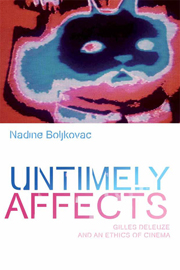5 - Signs Without Name
Published online by Cambridge University Press: 05 September 2013
Summary
Poetry is born of insecurity: wandering Jews, quaking Japanese; … moving about in a world of appearances: fragile, fleeting, revocable, of trains that fly from planet to planet … That's called ‘the impermanence of things’.
(SS)The artist tells him- or herself that this world has had different aspects, will have still others, and that there are already others on other planets; finally, the artist opens up to the Cosmos in order to harness forces in a ‘work.’
(ATP: 337)Lawrence … writes: ‘To be alone, mindless and memoryless beside the sea … Far off, far off, as if he had landed on another planet, as a man might after death.’
(ATP: 189)I'm writing you all this from another world.
(SS)A seemingly otherworldly, fleeting yet haunting series of visual, voice and sound assemblages amassed with the ‘relentlessness of a bounty hunter’ constitute the opening moments of Marker's 1983 Sans Soleil during which the narration announces: ‘He wrote: I've been round the world several times and now only banality still interests me’ (SS). At once specific, explicit and cryptic, the film's narration and images of time deftly manifest doublings and paradoxes of life, creation and experience: death and survival, memory and forgetting, horror and beauty, fragility and indestructibility, joy and loss, layers of life that simultaneously, collectively comprise, as Sans Soleil suggests, familiar and indecipherable aspects of existence that the films of this book seek to momentarily glimpse and distinguish.
- Type
- Chapter
- Information
- Untimely AffectsGilles Deleuze and an Ethics of Cinema, pp. 113 - 144Publisher: Edinburgh University PressPrint publication year: 2013



